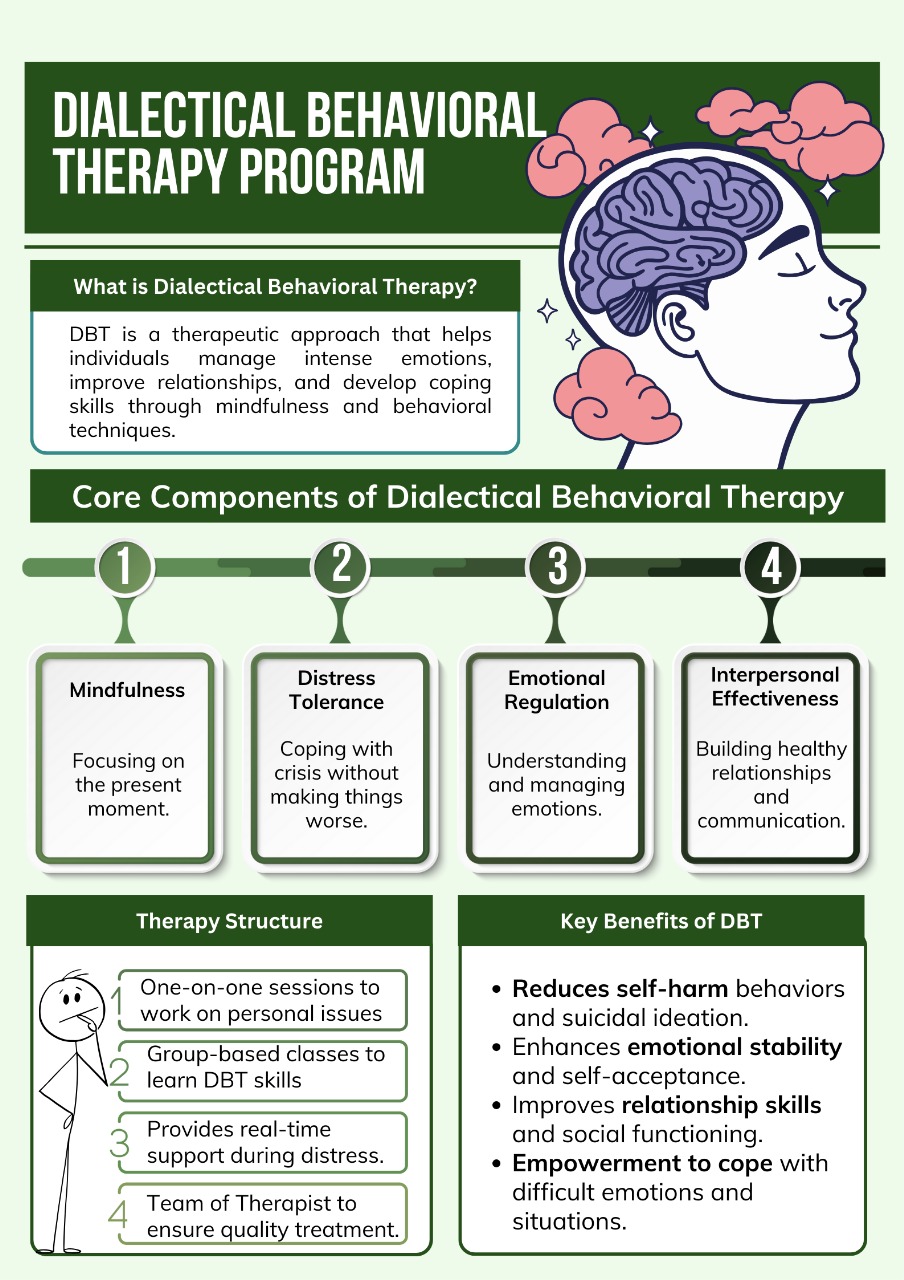DBT and Teen Mental Health: Harvard’s Best Programs for Teens

“We didn’t know our son could thrive again—until he actually did.”
Harvard’s focus on youth wellness isn’t just academic; it’s a lifeline for teens faltering amid anxiety, impulsivity, and self-harm. Did you know 18.4% of Massachusetts youth reported seriously considering suicide in the past year?
This article unlocks why Forest Behavioral Health, serving Harvard, stands as a beacon with its Dialectical Behavioral Therapy Program—where teens gain skills and hope.
Read on for a deep dive into transformative DBT strategies, essential local statistics, and why our holistic approach makes all the difference for families right here.
Understanding DBT: A Lifeline for Struggling Teens
Parents frequently ask me things like, “what is DBT anyway, and why should my kid take it?” In the late 1980s, Dialectical Behavioral Therapy (DBT) was created by Dr. Marsha Linehan, combining cognitive behavioral strategies with mindfulness components. It takes aim at those strong feelings that lead to a lack of impulse control. For instance, teens learn to stay present without judgment. This approach has transformed lives, especially for those battling mood swings or self-harm.
Research backs it up solidly. Multiple randomized controlled trials show DBT reduces self-harm by up to 50% in adolescents. (JAMA Psychiatry)
At Forrest Behavioral Health, our Dialectical Behavioral Therapy Program adapts these principles for real-world success. We focus on building skills like emotion regulation and distress tolerance. Picture your teen handling stress without spiraling—that’s the goal here.
The Core Skills That Make DBT Effective
DBT isn’t just talk therapy; it gives teens concrete tools they can use day by day. Core modules cover mindfulness for increased moment-to-moment awareness and interpersonal effectiveness to help improve relationships.
The JAMA Psychiatry studies show DBT diminishes suicidal ideas dramatically in high-risk youth. However, integrating these takes practice.
Ever wondered how these skills play out? Here’s a quick breakdown:
Mindfulness:
Helps teens observe thoughts without reacting impulsively.
Distress Tolerance:
Builds resilience during crises, preventing harmful behaviors.
Emotion Regulation:
Teaches navigating ups and downs, reducing anxiety spikes.
Interpersonal Effectiveness:
Improves communication, easing family conflicts.
Walking the Middle Path:
A teen-specific addition for balanced perspectives.

Forrest Behavioral Health weaves these into our Dialectical Behavioral Therapy Program, drawing from evidence-based models. Our experts, with years in dual diagnosis treatment, ensure sessions feel supportive, not clinical.
Why Teens Need DBT Now More Than Ever
It’s time to take just a quick action, as the teen suicide rate has increased 62% from 2007 to 2021. Moreover, anxiety affects 32% of 13-18-year-old teens. While depression hits 15.4% by age 17-18.
But DBT offers hope—it’s proven superior in managing these issues. At our center, we see real changes, like reduced family conflicts and boosted self-confidence.
Harvard’s Influence on Top DBT Programs for Teens
Feature | Harvard 3East Program | Forrest Behavioral Health (Bedford, MA) |
Affiliation | Harvard/McLean Hospital | Near Harvard, inspired by Harvard standards |
Age Range | 13–21 years | Adolescents/teens |
Program Type | Residential, intensive DBT | Flexible outpatient tracks |
Key Focus Areas | Self-injury, depression, trauma | Dual diagnosis, mood disorders |
Skills Training | Intensive DBT; mindfulness lowers anxiety by 30% | DBT skills weekly: mindfulness, emotion regulation |
Therapeutic Approach | Group therapy, individual sessions, family involvement | Group, individual, and family counseling |
Evidence Base | Refined by Harvard research | Mirrors Harvard, led by expert clinicians |
Accessibility | Premium, residential setting | Community-focused, accessible |
How Forrest Behavioral Health Customizes DBT for Your Teen
Every teen’s struggle is unique, like a fingerprint. At Forest Behavioral Health, our Dialectical Behavioral Therapy Program in Bedford, near Harvard, MA, builds individualized recovery trajectories. A 2024 follow-up reveals that tailored DBT cuts teen anxiety symptoms by 45%.
Our highly credentialed team of licensed therapists, providers, and medical experts works to address co-occurring problems such as depression and drug addiction. Our clients love how we empathetically help them.
Wondering how that happens? Here’s the breakdown:
- Comprehensive Assessments: Identify detailed needs, ranging from mood swings to trauma.
- Mind Body Spirit: Mix therapy, mindfulness & family sessions for all-over restoring.
- Flexible Programs: Day treatment (5 days a week) or IOP options work within your busy life
- Insurance Support: Most plans accepted – please call (781) 570-5781 to confirm.
Have you considered how family sessions could strengthen bonds? We include them to empower everyone.
Real DBT Case Study
A published case study describes “Kira,” a teen who self-injured to cope with intense feelings and communicate distress to friends. After receiving Dialectical Behavioral Therapy:
- She practiced mindfulness and emotion regulation to manage negative thoughts without resorting to self-harm.
- Refined social skills for better socializing.
- Left off using self-injury to cope.
At the conclusion of therapy, Kira no longer met criteria for self-injury and demonstrated a better mood, resilience, and relationship skills. Moreover, showing improved mood, resilience, and relationship skills. This case highlights DBT’s real-world effectiveness for adolescents struggling with similar challenges.

Overcoming Challenges in Teen Mental Health with DBT
There are many unique struggles that teens face, from pressures on social media to academic stress. Pew Research reports that 41% are overwhelmed by online time. DBT addresses this by teaching adaptive coping.
At Forrest, we incorporate experiential therapies, such as the one we conduct as a mindfulness walk, for active learning. In addition, our Intensive Outpatient Program (IOP) is conducive to very busy schedules: we offer meetings in the evening or on the weekend.
This flexibility allows teens to manage both school and recovery. Hundreds have learned to regain confidence with us: why not you? Contact us to start.
Building a Brighter Future: Why Choose Forrest’s DBT Program
Change often starts with a simple decision to reach out. At Forest Behavioral Health, we provide more than a program—we offer a lifeline rooted in understanding and expertise. With low relapse rates and ongoing support, we ensure a lasting change.
Ready to act? Call (781) 570-5781 or visit our Bedford location. Your teen deserves tools for a fulfilling life—let’s provide them together. Your teen’s next chapter can begin today, one call away.












